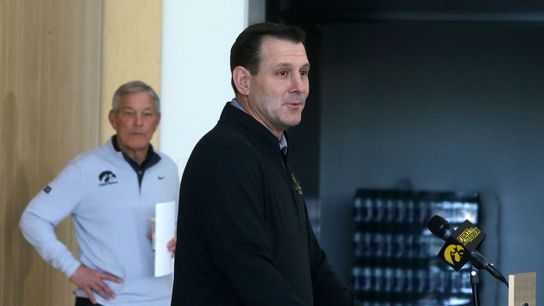Iowa is going to start trying again on offense.
No one came out and said those exact words in Iowa City on Tuesday, but that was the message.
Kirk Ferentz rode his son Brian's direction of the offense all the way to the bottom. Iowa's 3.94 yards per play were dead last in FBS -- no one else was below 4.3. The Hawkeyes' offense averaged an even 14 points per game, also last in the nation and well below the mandated 25 points, per the memorable terms of Brian's contract.
Iowa announced Brian Ferentz would not return on Oct. 30. Kirk waited until after Iowa's bowl game (a second consecutive shutout loss) to begin the search, which took nearly the entire month of January. During that time, Kirk Ferentz said he identified 10 to 12 candidates, had conversations with six and interviewed four.
In the end, Tim Lester was just the right amount of new and familiar. "Similar in a lot of ways to the way we've operated, yet a lot of new perspectives," Ferentz said.
Lester, 46, has never worked with Ferentz, and in fact was still in college when the longest-tenured active head coach took the Iowa job back in 1999. The former Western Michigan quarterback played in the XFL and the Arena League before entering coaching in 2000. Since then he's worked in high school football, head coached at a Division II and Division III school, served a stint as a defensive coordinator, then spent four years as a Power 5 quarterbacks coach before returning to Western Michigan as head coach in 2017. He spent 2023 as an analyst for the Green Bay Packers, studying the offense the team was about to face.
"We're going to be a physical football team, we're going to be disciplined, and we're going to be aggressive," Lester said. "Aggressive in everything we do from run game, to pass game, to keepers, to RPOs, to tempos. One thing I've learned in my time as a quarterback, quarterback coach, offensive coordinator and head coach at pretty much every level, it's about putting your players in the best position to succeed."
The recording of the press conference did not include a break for Lester to explain the meaning of "RPOs" and "tempo" to a certainly-confused Hawkeye fan base, but one can assume the omission just a technical error.
Though the terminology may be new, the head coach is the same -- and so is the directive of the offensive coordinator: don't turn it over, don't create too many negative plays, and don't screw up the defense.
"Part of Tim's job is going to be to figure out what to emphasize. You can only practice so many things and do them well. If that's something we deem to be good for our offense and we can execute it well and not take away from other things -- it's a balancing act a lot of times -- I'm open to anything right now."
Ferentz is openly proud of a culture and a formula that has produced .500 or better seasons 20 times in 22 years, but part of me wonders if he devoted any time over the past month to introspection. Allowing 14 points per game is admirable, but would he be willing to surrender another touchdown per game if, in exchange, his offense scored 28 per contest? I don't know if Ferentz asked himself that question and, if he did, the answer is still the same.
"It gets back to, what's the bigger picture? You can be a showy offensive team or a high-blitz team, and that stuff's all great until you give up the big play or you throw it to the other team, and all of a sudden your defense is out there defending 20 yards. I've just never been fascinated with that glitzy stuff that sometimes people get distracted by."
Every time Ferentz mentioned being aggressive on offense, he included an adjectives most commonly associated with the Las Vegas Strip -- "glitzy," "showy," "entertainment value" -- apparently assuming teams ran such offenses simply because they wanted to dazzle audiences, and not because they thought it increased their chances of winning. To Kirk Ferentz, offensive risk comes only with downsides, and a conservative approach to offense only offered upside. There is no upside to risk or downside to caution.
"We're trying to build a team that wins more often than not and fortunately we've been on the right side of that more than not, so trying to stay there and improve on that."
Just a few days on the job, Lester was open to the fact that he didn't know the players yet, and the coming weeks would be figuring out who they are, then dialing in to what they can do -- starting with the quarterback. "We've got to figure out how to be efficient, aggressive, run the ball, and help the team win, and we'll do those things," Lester said. "Whatever they are."
Lester ran Kyle Shanahan's Houston Texans playbook when he was the head coach at Elmhurst College in 2008, acquired through college teammate Matt LaFleur, who was Shanahan's assistant at that time. At Syracuse, he ran the spread. At Purdue, it was Sean Payton's Saints offense, brought over by then-Boilermakers offensive coordinator Terry Malone. He spent the past year reacquainting himself with the Shanahan system working under LaFleur at Green Bay.
Lester can bring any or all of that to Iowa City, depending on what the players can execute and what will best protect the Hawkeyes defense.
Asked, as a newcomer to the program with little-to-no familiarity with the current roster, what makes him confident he can improve Iowa's offense, Lester didn't have to think long. "I love tight ends," he answered with a smile.
As always, stay tuned to The Scoop for the latest.
